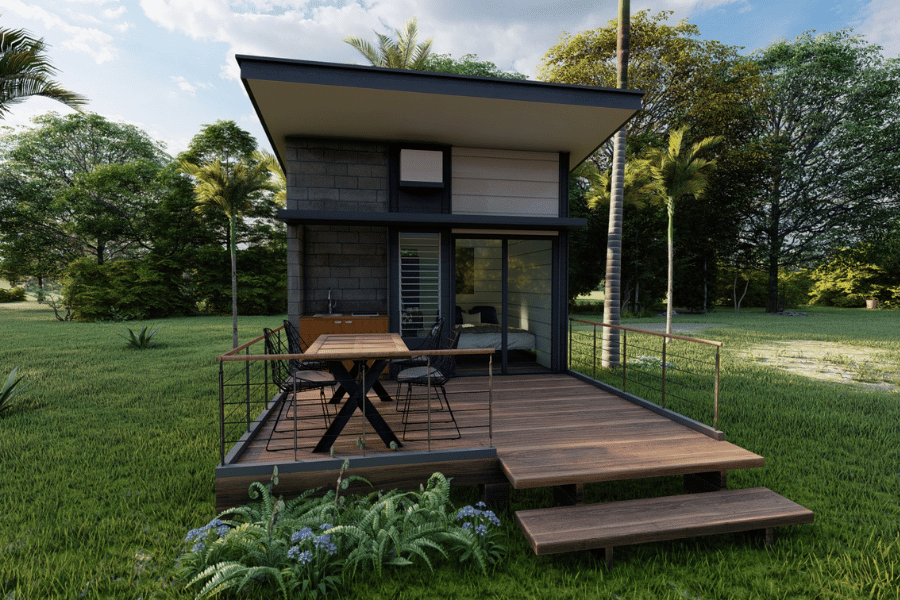Mother-In-Law Suites
Having an additional space for your in-laws is highly beneficial in your home. Follow along to learn what defines a mother-in-law suite, the different types, specific features, and more!
As a homebuyer, you've most likely heard the term mother-in-law suite. Your parents may ask you to add one to your home for when they get older or to keep your family close together. Plenty of households worldwide have them, whether it's necessary or a bonus feature of your home. Nearly 41% of Americans buying a home are considering accommodating an elderly parent or an adult child, and almost 20% of Americans lived with two or more adult generations in a single household in 2019. Mother-in-law suites can also be used as guest houses, home offices, short-term rentals, and more. So, what defines a mother-in-law suite?
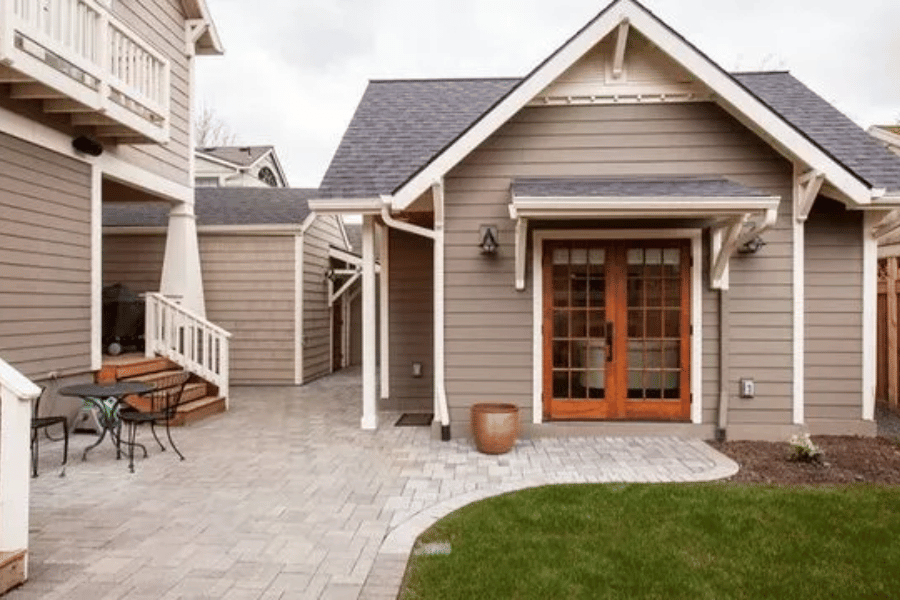
What Defines A Mother-In-Law Suite?
A mother-in-law suite is commonly defined as an additional living space within your property specifically designed for use by your in-laws. It is also seen as an extra space in your home that is fully functional, comfortable, and private from other parts of the house. To sum it up, mother-in-law suites can be a residence created within a home, an addition to an existing home, or an entirely separate unit on the property. While the name might be widely known as a mother-in-law suite, it can be used by anyone you'd like to house temporarily or for an extended period of time. Mother-in-law suites typically include one bedroom with an attached bathroom, but other features include a separate kitchen, entrance, living area, private patio/balcony, and more. These additional spaces are more technically known as Accessory Dwelling Units (ADUs). Still, they can also be referred to as accessory apartments, backyard cottages, garden cottages, granny flats, backyard apartments, tiny houses, mother-daughter houses, multigenerational suites, etc.
It's important not to confuse mother-in-law suites with guest rooms. Suites are fully functional and independent with plumbing, foundations, etc. They cannot be sold individually but must be sold with the property it was built onto. They can be detached, attached, interior, garage conversions, etc.
Standard Features In A Mother-in-law Suite
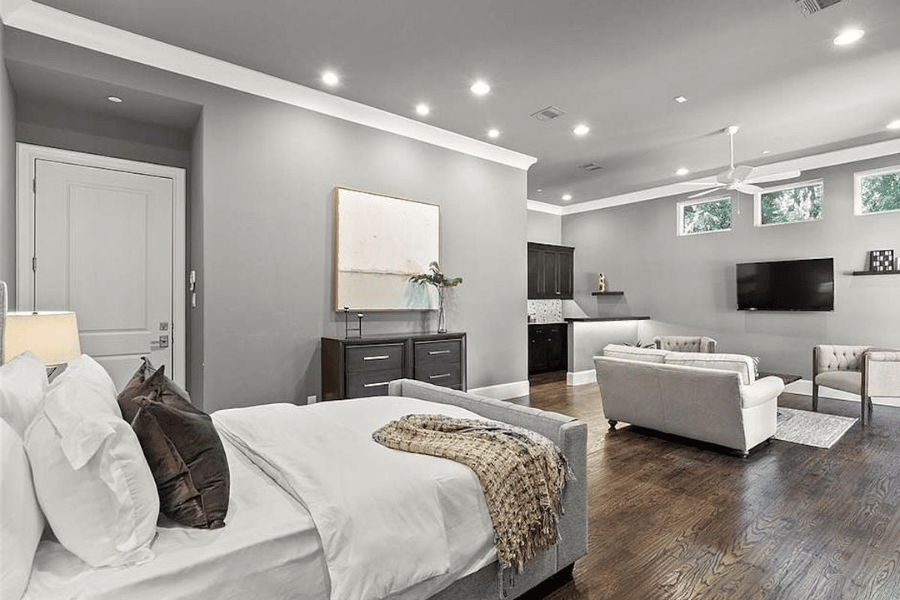
Mother-in-law suites were initially designed as comfortable and private long-term living spaces for elderly parents and grandparents. As your parents get older, it's common to want them close to you in case of emergency, if they have health care issues that need to be taken care of, to have them close to their grandkids, etc. To make them the most comfortable, it's typically for in-law suites to have their bedroom, bathroom, kitchen, living area, and any other amenity you deem necessary.
Bedroom
Mother-in-law suites need to have their own bedrooms so that guests staying or living in them do not have to enter the main home. The bedroom should have ample living space and adequate storage for clothes, personal belongings, etc.
Private Entrance
It's also common for in-law suites to have their own entrance. The goal is to have an additional space in your home without it feeling like you have other guests. Private entrances for attached or interior in-law suites allow for more privacy and independence. Detached suites will also have their own entrance since they are not part of the primary residence.
Full Bathroom
A majority of in-law suites also feature their own bathroom. The bathroom should include a toilet, sink, bathtub, and shower. Like having a private entrance, having your own bathroom allows in-laws and other guests to feel independent and offers them additional privacy.
Kitchen
It's not the standard, but some mother-in-law suites might also feature a small kitchen or kitchenette. They might include a mini refrigerator and a microwave but do not typically have a full-sized kitchen.
Living Space
Some suites will have a small living space to relax and unwind. There is usually enough room for a small sofa or chair, entertainment stand, tv, etc. This separate area makes it feel like you're not just living inside a bedroom and gives you more freedom to walk around. Different living spaces are more common in detached suites since they provide more room.
Different Types Of Mother-in-law Suites
Detached
Detached mother-in-law suites are standalone from the main house on the same property. These are most commonly used to house family members you want to keep close to you and will often have separate utilities. Detached suites can be tiny homes, guest houses, a garage converted into a living space, and more.
Tiny homes are one of the prominent examples of detached mother-in-law suites. They are similar to single-family homes but are typically under 600 square feet. They became most popular during the pandemic when people were looking for additional space for their relatives or a more affordable home. The average cost of a tiny home is $52,000, which is 87% cheaper than the average price of a traditional home.
Attached/interior
Unlike detached units, attached suits are additions to the home's existing structure. You can either build onto your home or convert a space already within the house into a mother-in-law suite. Examples include living spaces above attached garages, converted attached garages, or an addition to an existing home. The attached mother-in-law suites share a wall with the primary residence, but there isn't an internal entrance from the main house into the suite. Interior suites are located within the main home, and they still must have their own bedroom, bathroom, kitchen, and private entrance.
Interior mother-in-law suites are typically basement apartments or attack apartments. The definition is in the name, but a basement apartment is defined as an apartment located below street level, underneath another structure. They are most common in bigger cities like New York but can be found in many smaller cities and towns. Not every basement can be converted into an apartment. For example, a basement apartment in New York must follow specific federal and state regulations, such as:
- The ceiling must be at least seven feet high
- Every room must have at least one window
- Any room must be at least 70 square feet in size to be considered a bedroom.
- Inte3rior doors must be at least 1.75 inches thick, and the exterior door must be at least 32' X 78"
- There must be at least two means of exit from the bedroom (door and at least one window)
- Bedroom windows must measure a minimum of 5.7 square feet
- All walls must be water-proof and damp-proof
- There must be smoke detectors and carbon monoxide alarms installed inside the unit.
- There must be heating and cooling mechanisms in sleeping areas
- Buildings with basement apartments should have a certificate of occupancy
- The unit should have well-maintained electrical and plumbing systems
These regulations are standard in most states, but checking your area's rules is essential before adding a basement apartment.
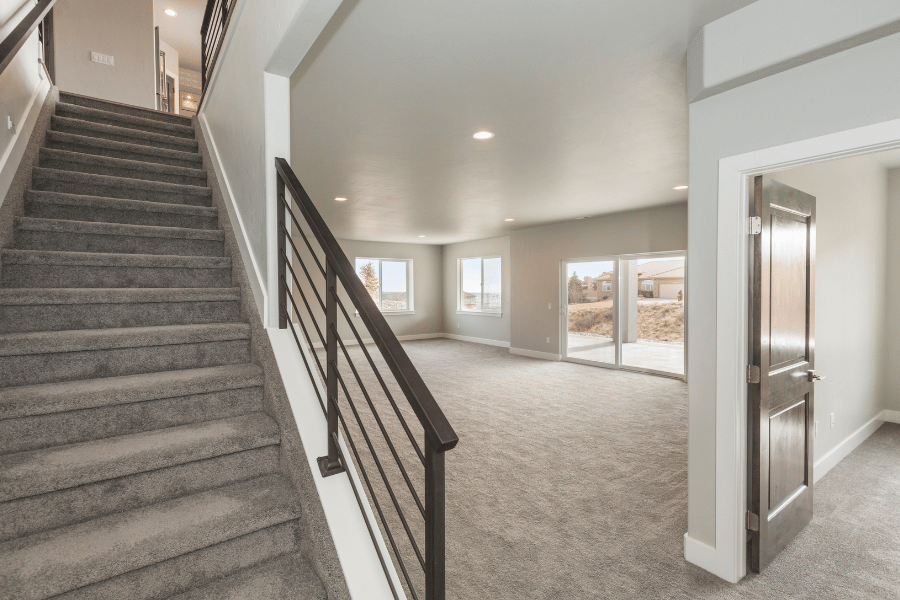
Cost To Build A Mother-in-law Suite
The cost to build a mother-in-law suite depends on the area you live in, the type of suite you intend to add, the size of the suite, and the amenities you want to incorporate. Before starting the building process, you'll want to ensure your HOA allows mother-in-law suites and check the requirements for adding to your home.
If you've decided that an in-law suite is the best decision for you, it's time to start running some numbers. Building an addition to your home or converting an underutilized space can be costly. It's important first to decide how big you want the space to be, how many people will be living in the space, what amenities you want, etc. Based on the type of mother-in-law suite that best suits your situation, it can cost you anywhere from $10,000 to $130,000. According to home advisor, the cost to build is:
| Type of mother-in-law suite | Average cost |
| Converting a finished room | $10,300 - $10,750 |
| Extending a room | $20,600 - $54,800 |
| Converting a garage | $20,000 - $60,000 |
| Converting a basement | $10,000 - $30,000 |
| Building an accessory dwelling unit | $40,000 - $125,000 |
If you decide to add an accessory dwelling unit (ADU) to your property, the cost mainly depends on the size of the unit. The average cost to build on your property is roughly $82,000 but can range anywhere from $40,000 to $125,000. The typical cost per square foot is $100 to $200 per square foot, including materials and labor.
| Square Feet | Average Cost |
| 400 square feet | $40,000 - $80,000 |
| 500 square feet | $50,000 - $100,000 |
| 600 square feet | $60,000 - $120,000 |
| 750 square feet | $75,000 - $150,000 |
You cannot base the price of building a dwelling unit based on size. There are countless other factors to be considered, such as the cost of materials, labor, etc. The most common professionals you will need to hire include an architect, electrician, plumber, general contractor, etc. Additionally, you will need an HVAC unit, which can be costly, and other materials to build the structure, including:
- Support beams and roof trusses
- Plumbing fixtures
- Bathroom Plumbing
- Drywall and insulation
- Foundation materials
- Electric meter
- Water heater
- Paint
- Siding
- Windows
- Doors
- Floors
Building an accessory dwelling unit on your property is the most expensive type of mother-in-law suite. If it's not in your budget, consider converting a finished room, garage, basement, or attic. These few options are less costly and typically provide you with the same benefits and features.
Benefits Of A Mother-In-Law Suite
Mother-in-law suites can be used for various reasons, so there are many added benefits. They can house your in-laws, or be rental units, office spaces, separate entertainment areas, etc. Adding a mother-in-law suite is a great way to add square footage to your home if your primary residence is too small or overcrowded. The added square footage can also increase your property's value in the future.
Another benefit is the ability to have your in-laws close to you. This can be important for some families if there are health issues involved and you are their caregiver. You may also want your in-laws or elderly parents close to you so they can be near their grandchildren for added support, guidance, and more.
Independence and privacy is an added bonus to detached mother-in-law suites. Some elders may not want to feel like a burden if they need living assistance, so the independence and privacy of their own space and entrance give them comfort and peace of mind.
The additional uses are also beneficial. If you don't need space for family, it can be used in various ways. It can be a guest house for friends in town, a fitness area, a craft room, a rental unit, etc.
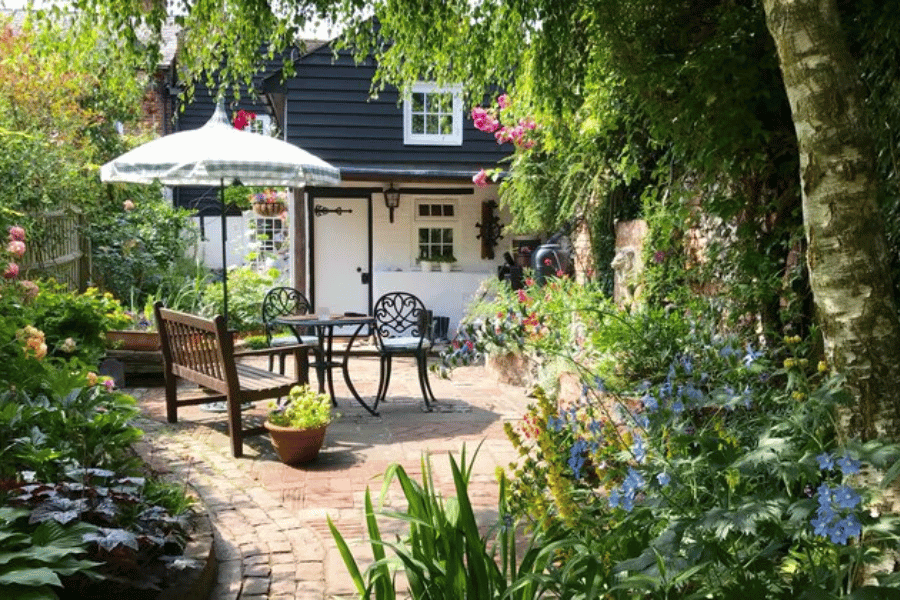
FAQ
Why is it called a mother-in-law suite?
Mother-in-law suites are most commonly used as homes for your in-laws or other family members, whether it be temporary housing or permanent.
Can I build an in-law suite in my backyard?
Yes. But you must check the local zoning and HOA laws before committing to the project.
Does a mother-in-law suite count as square footage?
If the mother-in-law suite is attached or accessible through the house, it can be counted towards your square footage. Detached mother-in-law suites should not be counted.
What are other names for mother-in-law suites?
Granny flat, guest house, Phana suite, secondary unit, accessory dwelling unit, tiny house, etc.
What Is A Mother-In-Law Suite - Final Thoughts
If you have elderly parents who might need your assistance or children returning from college who need to live with you while they get on their feet, a mother-in-law suite can be a great addition to your home. Whether you choose a detached, attached, or interior suite, all add great benefits and additions to your home that family or visiting friends can use. If you don't need to use an additional suite for family, it can also be a great investment opportunity for a rental unit or Airbnb. If it's within your budget, mother-in-law suites can give your family independence and privacy while living with you, increase the value of your home, or generate additional income. If you're interested in finding a property with a mother-in-law suite, please get in touch with us or continue browsing our website for more information and available properties.
